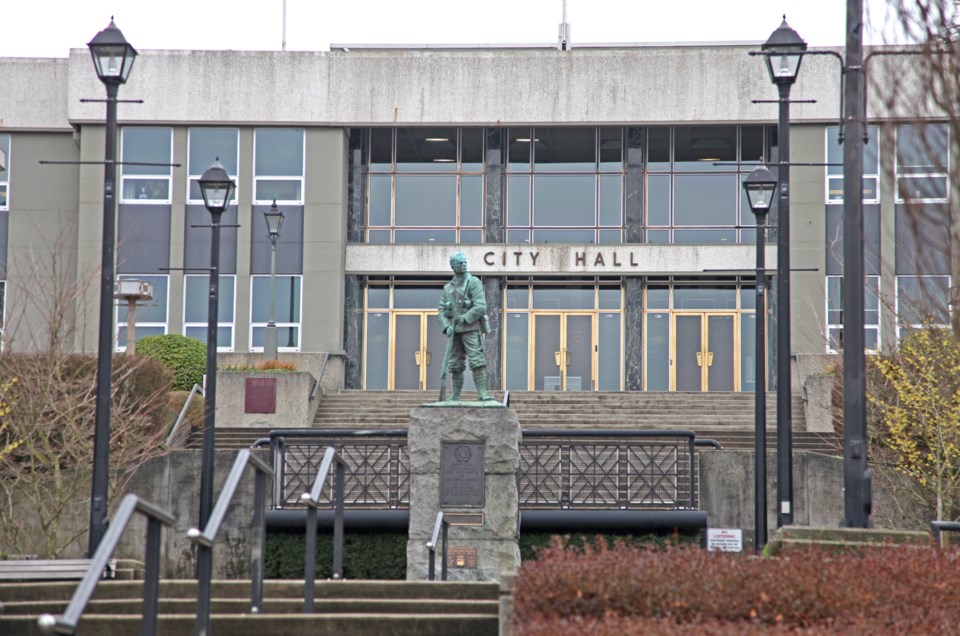Senior governments are to blame for some of the rising costs being passed on to local taxpayers.
That’s the gist of discussions in council chambers Monday night, when city council received a staff presentation and heard from community members about the city’s 2018 to 2022 financial plan, which proposes a 2.95 per cent property tax increase and a new one per cent capital levy. Taxpayers are also facing utility rate increases for water (six per cent), sewer (seven per cent) and solid waste (three per cent).
Colleen Ponzini, the city’s acting chief financial officer, said wages and benefits represent about 67 per cent of the city’s operating budget. In addition to pressures on existing services and infrastructure resulting from a growing population and development, she said external factors such as downloading from senior levels of government also impact the budget.
West End resident Bill Zander said he doesn’t have a problem with any particular aspect of this year’s $124.1-million budget, but voiced concerns about the impact on some citizens. While his family can afford to pay the increases, he said there are a lot of people who are on fixed incomes or are living under the poverty line.
“The four per cent for some of them, it might be a back breaker because their landlord is going to raise their rent and they are already against a wall,” he said. “We can look at some real problems in this town and in this country if things keep going the way they are.”
Zander said downloading from the provincial and federal governments creates a huge problem for the taxpayers and can be seen at the municipal level where infrastructure such as roads and sewers are falling apart.
“The downloading from the federal government, in my opinion, is an outrage,” he said. “I am surprised it isn’t raised here in council.”
The city’s 2018 capital program is $63 million, of which $50 million is projected to be funded from reserves, $7 million from debt and $6 million from grants and contributions. Projects included in this year’s capital budget include the relocation of the animal services and tow yard, uptown library renovations, city hall renovations and seismic work, improvements to the city’s transportation and parks infrastructure, buildings and fleet maintenance, and design work on the Canada Games Pool and Centennial Community Centre replacement.
The city is introducing a new one per cent capital levy, which will initially be put toward the Canada Games Pool/Centennial Community Centre project. Some residents wrote to council expressing concerns about the levy, with some saying the city needs to “better manage” the tax dollars it collects.
“In an already overtaxed city the proposed Canada Games Pool infrastructure levy goes too far. The need to do something about CGP has been around for years, and necessary action should have been part of the city’s regular budgeting process,” said Arthur Close in an email to council. “Once in place, the levy will not disappear. A new infrastructure need will arise to justify its continuation and on it will go to become a permanent additional tax like that for garbage collection etc. In a well-managed city, a special levy like this should not be necessary, and this ill-conceived idea should be killed forthwith.”
Mayor Jonathan Cote assured Zander that city council has been “a strong advocate” against the downloading that’s happened over the last number of decades, most recently when it relates to the housing crisis.
“For too long, municipalities have been downloaded onto,” he said. “I think it surprises folks that only eight cents on every tax dollar goes to local governments, yet when you think of all the types of work we do and the responsibilities that local governments have, the things we work on is what people see in their neighbourhoods and are important services that are there, but we don’t necessarily have the support we may have had in previous generations from senior levels of government.”
Coun. Patrick Johnstone said the city is working hard to try and access some of the federal infrastructure money that’s been promised.
“We are aware that there is a program coming. We are doing everything we can to prepare ourselves to apply for that when it is available, and hopefully we can reduce the load a little bit on major projects, like Canada Games Pool, when that becomes available,” Johnstone said. “I hear you and I hear many people in the community who are saying exactly the same thing – these increases are getting difficult. I don’t have a better answer than we need to continue to pay for the infrastructure that we need to pay for, and I hope senior government help is coming.”
A staff report stated the electrical utility is budgeted to have a three per cent increase this year, but that will be considered in late March.
“B.C. Hydro is currently doing a review of their rate structures, and given that our purchase of electricity from B.C. Hydro is directly from them, that will have a very significant impact,” Cote said. “Likely, the numbers that are presented today are outdated and actually not reflective of what we might be seeing. We actually have to know what B.C. Hydro is doing before we are able to move forward with that discussion.”



